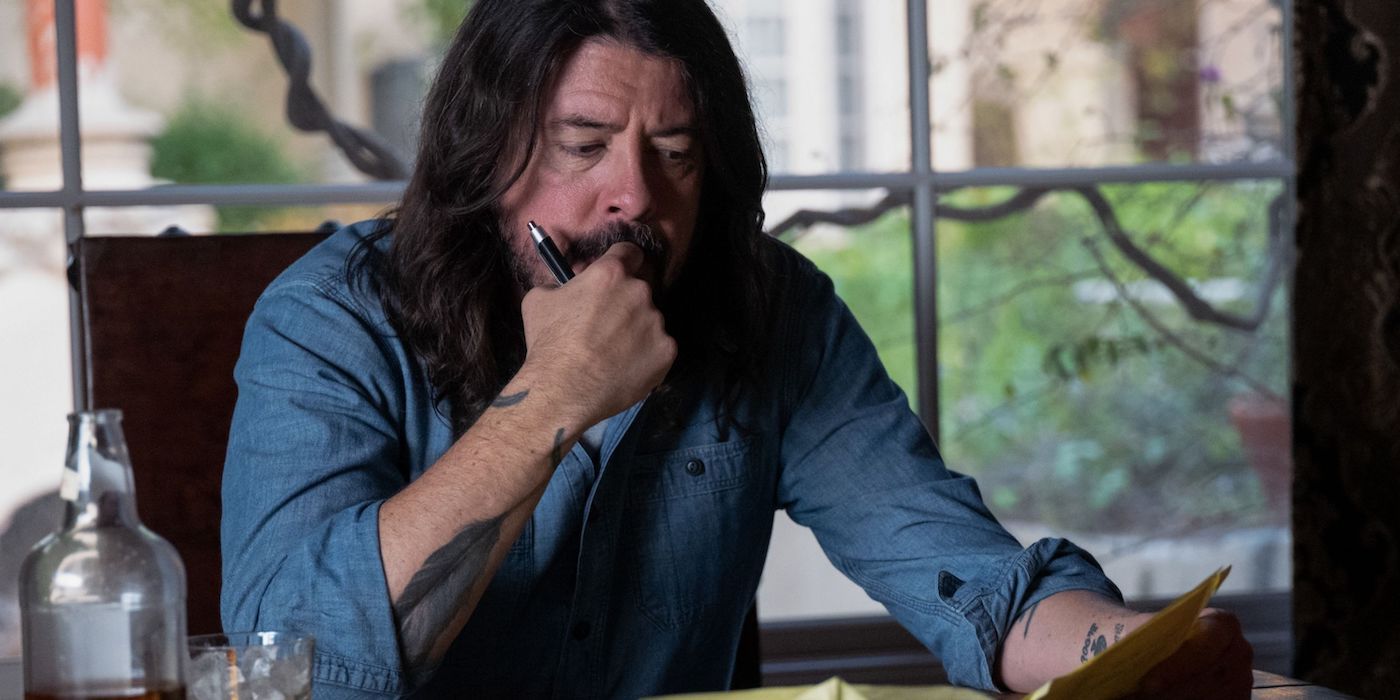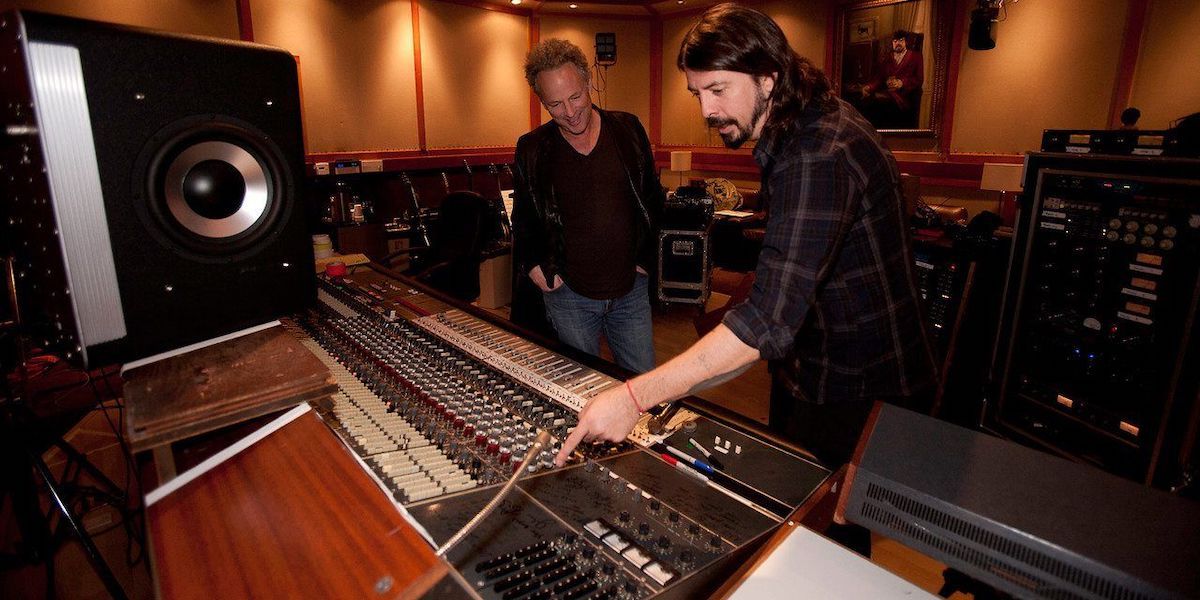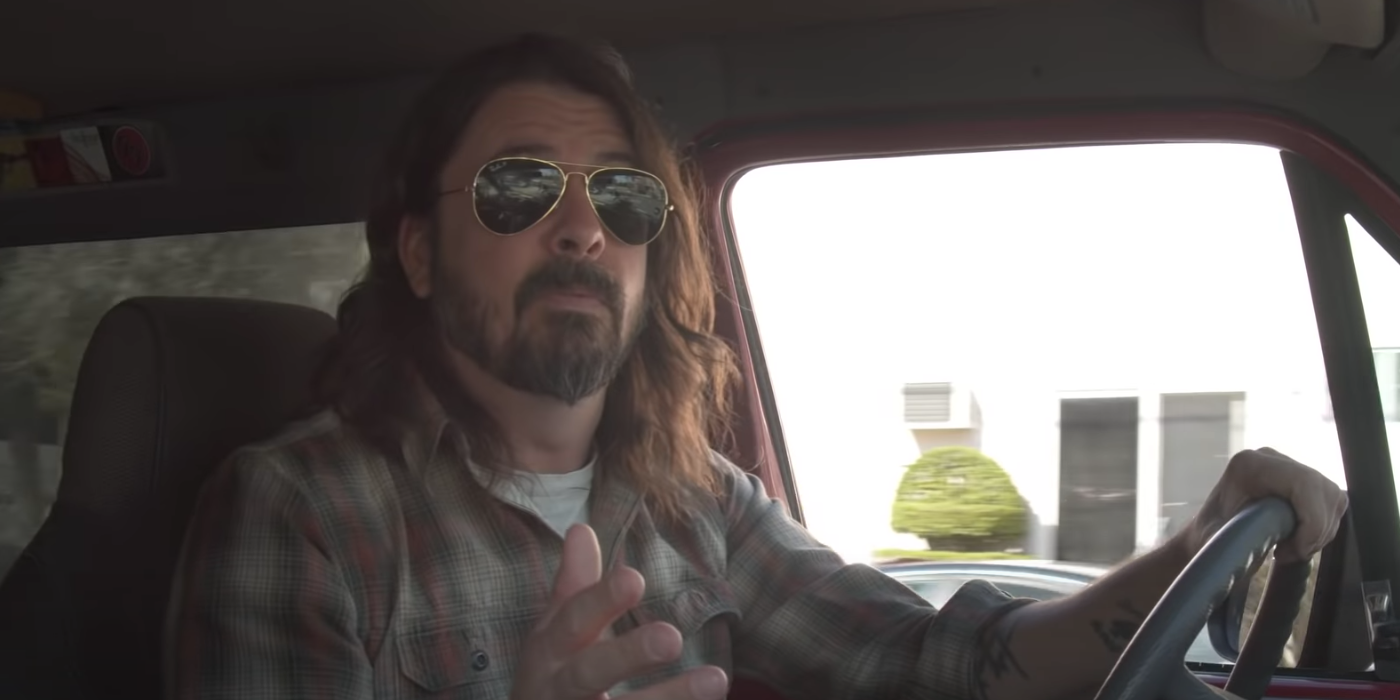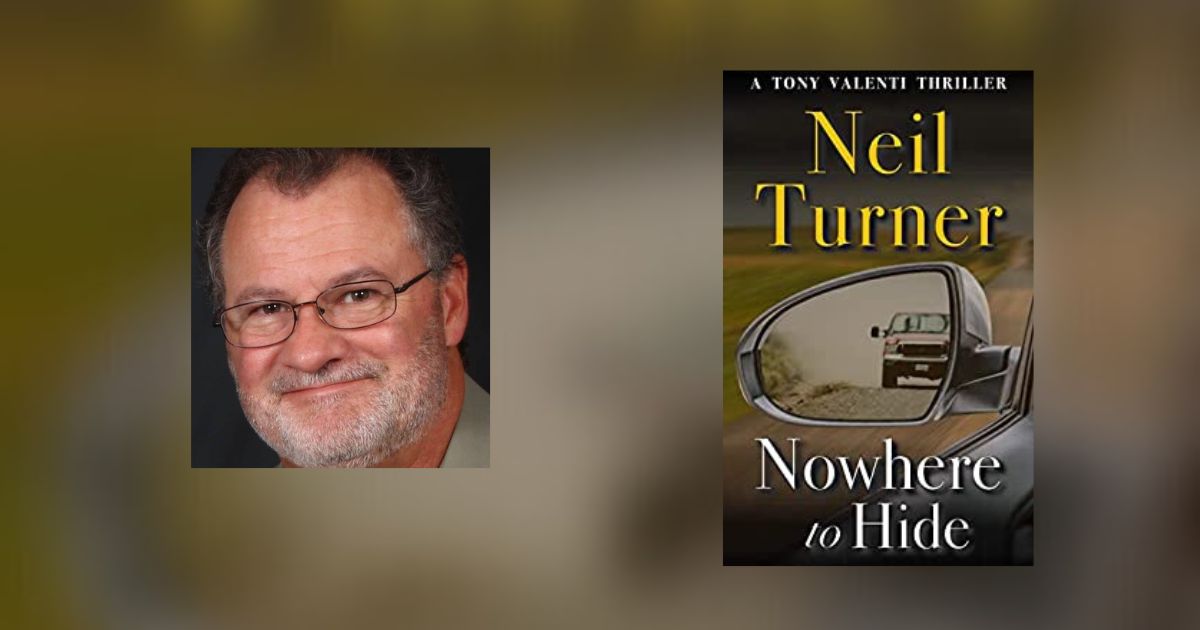Ever since he rose to international acclaim when he became the drummer for one of the most famous bands in musical history, Dave Grohl has managed to exceed expectations. But beyond the musical success his talent and passion have brought him, Grohl has also proven to be a skilled director.
Dave Grohl’s Music Career
Dave Grohl’s career is that of risks that paid off. He dropped out of high school to join Scream. After being in Scream for years, touring across the country and even the world, sleeping in squalid standards, running away from skinheads, living off of food from convenience stores, and spending the little money he had left over on marijuana, he took another risk and left the band that had become family to him to join Nirvana, people he hadn’t even met, in Seattle and live with Kurt Cobain in his tiny apartment, surviving off of corn dogs. With Nevermind eventually being certified Diamond, one can comfortably say that Grohl, once again, took a risk that was worth it. Nirvana’s music defined an era. But it all came to a screeching halt on April 5, 1994.
With Kurt’s passing, Nirvana lost an irreplaceable frontman. Standing in the ashes of one of the greatest bands to have ever existed, Grohl did what he loves most: make music. In 1994, Dave Grohl founded Foo Fighters – a one-man project that produced a successful debut album. Eventually, Foo Fighters, a name inspired by unidentified flying objects discovered by pilots during WWII, would consist of more than just one foo fighter. What started simply as a project evolved into Dave Grohl’s second majorly successful band.
Dave Grohl Is a Drummer, Singer, Guitarist, & Director
Dave Grohl has actually directed a number of things: music videos, documentaries, and a docuseries. In all of his directorial works, his love and appreciation of music is a theme throughout all of his projects. He has a knack for honing in on under-talked-about aspects of the music industry and bringing attention to them. He’s managed to interview many other music legends in his work.
Dave Grohl Has Directed Several Foo Fighters Music Videos
Grohl has directed several of the Foo Fighter’s music videos. His first directing credit is from the 1997 “Monkey Wrench” music video. In it, Grohl along with his bandmates are trying to break into an apartment they hear “Monkey Wrench” playing. Eventually, they manage to bust through the door only to find an empty room. They look outside the window and see the musicians who were singing. The musicians are also them, just not the them that was trying to get inside the apartment–make sense? Some of the over music videos he has directed have been for songs like “My Here,” “Rope,” and “All My Life.” What’s refreshing about Grohl is that, unlike many rockstars that have egos comparable to Mt. Everest, he doesn’t take himself too seriously. Foo Fighters was a departure from Nirvana in that while his former band had music videos about rebellious youth, references to The Beatles, and whatever “Heart-Shaped Box” was about, many of Foo Fighters’ videos are comedic.
In an industry obsessed with looking cool, Foo Fighters, at times, can run from that very notion. In “Hot Buns,” the Foo Fighters are truckers frolicking around in a truck stop shower; soap was dropped, pee was on the floor, the boys each have mischievous grins, and for the four-minute-length of the video, the Foo Fighters prove that rockstars can be unabashedly silly. It’s a freeing release from the constraints rockstars would have to confine themselves to–looking jaded, looking apathetic, looking too cool to care. For the band’s “Run,” a nursing home breaks out into mayhem. It’s geriatric chaos as patients abscond the facility, break into a car, and escape a perkily evil nurse played by Missi Pyle who’s perfect for the role.
‘Sound City’ Is Dave Grohl’s Entry into Documentary Filmmaking
Sound City, Dave Grohl’s first documentary he directed, was released in 2013. Sound City is about the legendary recording studio where bands and artists like Fleetwood Mac, Tom Petty, Red Hot Chili Peppers, and Neil Young have recorded. The documentary is rich in interviews. Musical titans like Stevie Nicks, Rick Springfield, and Kevin Cronin make appearances and speak about the significance the studio has had on their careers. Fleetwood Mac only became the decade-defining success that it was because of Sound City Studios. In 1974, while Fleetwood Mac was at the studios, they heard a single from Buckingham Nicks–a duo composed of Lindsey Buckingham and Stevie Nicks–and were interested in bringing Buckingham into their band. But Buckingham would join on one condition: his girlfriend, Stevie, would also join the band on the first day of 1975. Without Sound City Studios, the world be devoid of musical masterpieces such as “Landside,” “Go Your Own Way,” and “Dreams.”
The documentary provides so much musical history. But it isn’t tunnel-vision-focused on just artists; the former employees of Sound City were also interviewed and provided great insight into what the recording business was like. As digital began to overtake tape recording as the primary way to record music, Sound City remained old school. Things looked like they were about to come to an end for the studio that had seen and recorded so much talent. But a band from Seattle named Nirvana recorded Nevermind there. After the album’s gargantuan success, Sound City experienced a windfall of renewed interest. But, alas, times were changing and so was the music industry. The humble studio was unable to keep up with the technological advances that were taking place in the music industry. With advancing technology, the need for traditional studios became less necessary. In the end, Sound City had to call it a day and ended commercial recording in 2011. Grohl brings out the studio’s rare custom analog Neve console, one of only four in the world, and installs it in his personal studio, Studio 606. Sound City ends with a jam session with famous musicians who recorded at Studio City, one of them being Paul McCartney.
Dave Grohl Follows up ‘Sound City’ With ‘Sonic Highways’
Released in 2014, Dave Grohl directed the docuseries Sonic Highways after the success of Sound City. “After making Sound City, I realized that the pairing of music and documentary works well because the stories give substance and depth to the song, which makes for a stronger emotional connection. So I thought, ‘I want to do this again, but instead of just walking into a studio and telling its story, I want to travel across America and tell its story.” Grohl said of his inspiration behind deciding to crate and direct Sonic Highways. Sonic Highways focuses on a city’s music scene and contribution in each episode. The series covers the music scenes, influences, and histories of Chicago, Washington D.C., Nashville, Austin, Los Angeles, New Orleans, Seattle, and New York. In each episode, Grohl visits a city and meets with artists that have contributed to their city’s musical landscape. The series is a love letter to all the United States’ music hubs. In addition to learning about the music culture of certain areas, Sonic Highways delves into the stories of artists. We learn how bands got their start, what it was like to hit a peak, and how it was to fade.
The series is full of interesting people who have so many stories and experiences that it could equate to ten different lives meshed together in one lifespan. We also get to learn about Grohl in the Washington, D.C. (where he’s from) and Seattle (where he got his big break) episodes. There can also be a touch of melancholy in Sonic Highways; many musicians were never able to realize their ambitions of major success. Some didn’t want it, though, but others did and, whether it was the wrong place wrong time, or some other variable, it just didn’t work out. For most musicians, the joy of playing music can suffice, but the series also unintentionally reminds viewers that the path to music stardom is paved with many broken dreams. Dave was talented and doggedly pursued his musical ambitions, but there were many other Daves who were also determined and loved making music that just never made it themselves.
In ‘What Drives Us,’ Dave Grohl Tackles Musicians on the Open Road
What Drives Us is Grohl’s 2021 documentary about the life of musicians on the open road. In his memoir, “The Storyteller: Tales of Life and Music,” some of Grohl’s most interesting anecdotes are about his travels as a young guy. Part of being in a band that is trying to expand beyond their city is van life. While the life of a successful musician can seem glamorous– the cover of Rolling Stone, hotel suites, sold-out shows– starting out in the music industry is anything but. This is best epitomized in the unglamorous travel of bands that haven’t had their big break. Van life is a group of people, along with musical equipment, crammed together as they drive across a country or continent. The documentary interviews seasoned musicians like Flea and Tony Kanal as they regale Grohl with their own stories of their experiences touring.
What Drives Us also documents two up-and-coming bands as they embark on their own “van life” experiences. In the documentary, van life is portrayed for what it is: dirty, challenging, but also fun. Though far from the comfort that successful artists enjoy when on tour, van life can be a formative experience for musicians. Despite all the discomfort that can come with driving a van across the country, musicians also spoke about how some of their best memories come from their time on the road. Grohl even managed to track down the van he toured in and drove around in it while being interviewed. We’re reminded that at one time even The Beatles were just some boys touring in a van, trying to make it. Life on the road isn’t for everyone; but for many, there’s no place they’d rather be than on highways headed to the next gig.
Dave Grohl’s passion for music is made clear through all his directing choices. He has gone beyond making music to making sure that music history, culture, and understanding are expanded upon and preserved. And Grohl, the good guy of rock ‘n’ roll, is the perfect person to enlighten viewers with depths of musical knowledge. Everyone who watches his directorial works has a deeper appreciation for music and the people who create it. Who would have known that a kid from suburban Washington, D.C. would go on to contribute to music in so many meaningful ways? Here’s to you, Dave Grohl.























































![Social Media Spring Cleaning [Infographic] Social Media Spring Cleaning [Infographic]](https://imgproxy.divecdn.com/9e7sW3TubFHM00yvXe5zvvbhAVriJiGqS8xmVFLPC6s/g:ce/rs:fit:770:435/Z3M6Ly9kaXZlc2l0ZS1zdG9yYWdlL2RpdmVpbWFnZS9zb2NpYWxfc3ByaW5nX2NsZWFuaW5nMi5wbmc=.webp)
![5 Ways to Improve Your LinkedIn Marketing Efforts in 2025 [Infographic] 5 Ways to Improve Your LinkedIn Marketing Efforts in 2025 [Infographic]](https://imgproxy.divecdn.com/Hv-m77iIkXSAtB3IEwA3XAuouMwkZApIeDGDnLy5Yhs/g:ce/rs:fit:770:435/Z3M6Ly9kaXZlc2l0ZS1zdG9yYWdlL2RpdmVpbWFnZS9saW5rZWRpbl9zdHJhdGVneV9pbmZvMi5wbmc=.webp)















